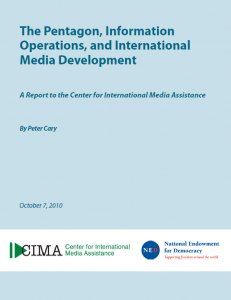People are more likely to lie, exaggerate and distort when they know they won’t be held accountable for what they said, and people like to say what their interlocutors want to hear, says Jordan Stancil.
Jordan Stancil is a lecturer in the Graduate School of Public and International Affairs of the University of Ottawa.
Phi Beta Iota: This is the single best overview of how secrecy supports corruption. It is consistent with testimony to the Moynihan Commission on Secrecy and with Morton Halperin's findings in Bureaucratic Politics and Foreign Policy in which one of the “rules of the game” was “Lie to the President if you can get away with it.” Today, the “rule of the game” is “Lie to the public if you can get away with it for at least one election cycle.” Newt Gingrich started the decline with his power and ambition, Dick Cheney peaked at 935 documented lies that Colin Powell allowed to stand unchallenged, and now Obama, with Bloomberg in the wings, are the anti-climax of secrecy as fraud Of, By, and For Wall Street. America has become a cheating culture, an unthinking culture, far removed from the essence of a Republic.
Middle East Online
First Published: 2010-12-05
On WikiLeaks and Government Secrecy
The more I think about the WikiLeaks episode, the less I know what to say about it. Unfortunately, too much commentary, right and left, has tried to inject certitude where ambivalence should be.
It is not clear whether the WikiLeaks disclosures will damage our national interest. During the few years I spent as a Foreign Service officer, in Jerusalem and Berlin, I produced and read a fair number of classified cables, and I understand the rather obvious point that diplomats might get more — and more sensitive — information when their contacts believe that what they say will remain secret. We have heard endless appeals to “common sense” about the need for secrecy on these grounds.
But common sense also tells us that people are more likely to lie, exaggerate and distort when they know they won’t be held accountable for what they said, and that people like to say what their interlocutors want to hear. The annals of diplomatic communication, indeed of all communication, are filled with evidence of this banal insight, which many people seem to have forgotten in their rush to defend government secrecy.
This is a permanent reference. Read the rest below the line, followed by links.
Continue reading “Reference: On WikiLeaks and Government Secrecy + RECAP on Secrecy as Fraud, Waste, & Abuse”







